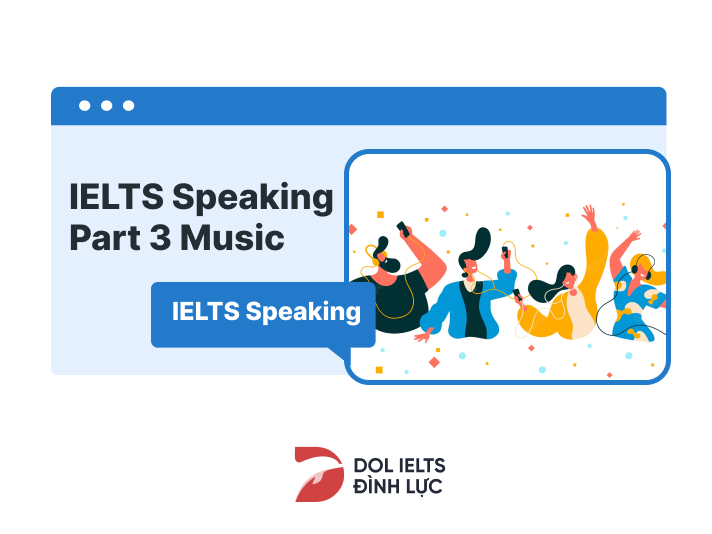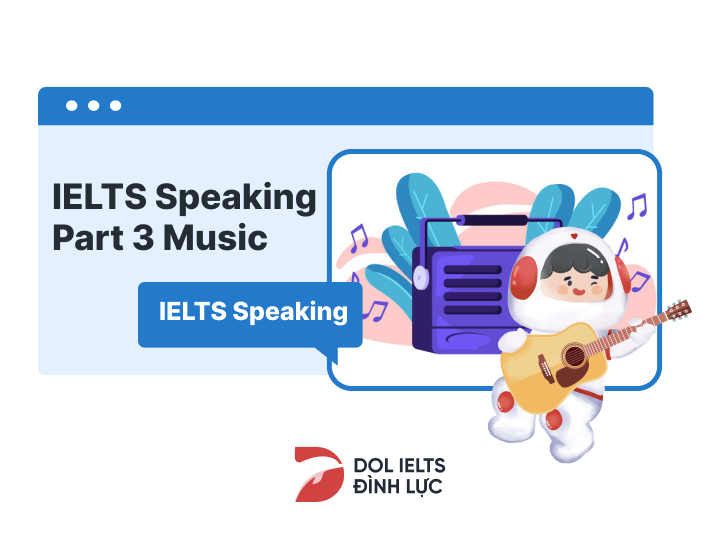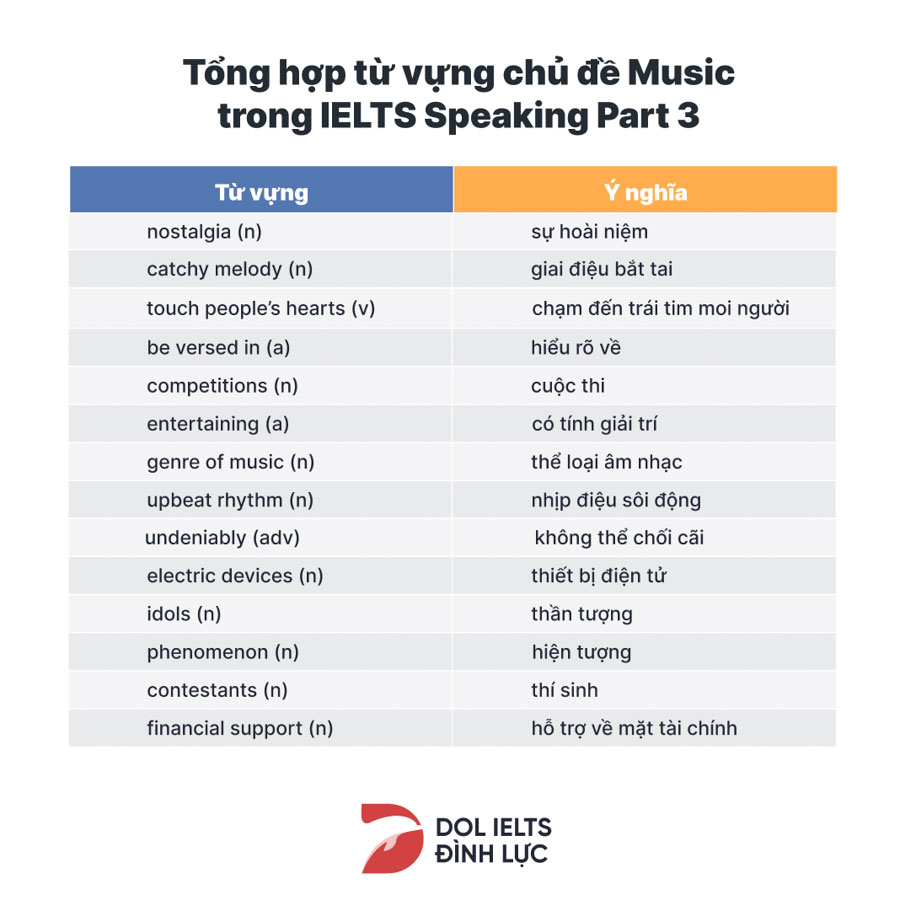Câu hỏi IELTS Speaking Part 3 topic music và cách trả lời
IELTS Speaking part 3 music là một trong những chủ đề khó nhằn làm vô số thí sinh bị kẹt lại ở phần phát triển và đưa ra ý tưởng. Vì vậy việc bổ sung từ vựng cùng chủ đề để giúp phát triển 1 câu trả lời hoàn chỉnh và chất lượng là điều hoàn toàn cần thiết. Thông qua bài viết này, DOL sẽ giới thiệu những IELTS Speaking music vocabulary để giúp các bạn có đủ vốn từ giải quyết chủ đề này, cùng với đó là loạt câu hỏi và sample trả lời cho các câu hỏi phổ biến.
DOL IELTS Đình Lực
Feb 08, 2023
2 mins read

Table of content
1. What kind of music do people like at different ages?
2. What kind of music is popular in your country now and what kind will be in the future?
3. Do parents in your country require their children to learn and to play musical instruments?
4. Why do some people like to listen to live music while others prefer CDs?
5. Why are many music competitions popular in Vietnam?
6. What kinds of music do young people like?
7. What kinds of people like traditional music?
8. What do you think influences a young person’s taste in music?
9. What do old people like to listen to?
10. How would your grandfather feel if you gave him some hip hop music to listen to?
11. How has music been used as a means of personal expression?
12. What are some of the intersections between music and other art forms, such as literature, visual art, and dance?
13. What is the role of music in society, and how has this role evolved over time?
14. What are some of the challenges facing musicians and composers in the modern age?
15. How do different cultures and civilizations approach appreciation of music?
Câu hỏi thường gặp:
1. What kind of music do people like at different ages?
Sample answer:
I think old people love the feeling of nostalgia, which means that they tend to listen back to old songs that bring them good memories. Meanwhile, youngsters are subjected to the people surrounding them. They may turn to love a song simply because people around them listen to that song. The fear of being left behind makes them constantly update to new trendy songs.
However, it doesn’t mean that people in a certain age group listen to a particular genre of music. The ultimate aim of music is to touch people’s hearts regardless of their age, sex, or race.
Vocabulary:
nostalgia (n): sự hoài niệm
bring them good memories (v): mang lại kí ức đẹp
are subjected to: bị ảnh hưởng bởi
trendy songs (n): bài hát theo xu hướng
ultimate aim (n): mục đích cuối cùng
touch people’s hearts (v): chạm đến trái tim moi người
2. What kind of music is popular in your country now and what kind will be in the future?
Sample answer:
From my point of view, pop music is dominating the music industry in Vietnam. This is very understandable since its catchy melody and upbeat rhythm can easily appeal to young people. However, because I’m not versed in this field, I’m not sure what genre of music is anticipated to be ubiquitous in the future. Probably, rap and hip-hop might become mainstream. It is evident that there are more competitions in these kinds of music, and so far they have received positive feedback.

Vocabulary:
dominating (a): chiếm ưu thế
catchy melody (n): giai điệu bắt tai
upbeat rhythm (n): nhịp điệu sôi động
be versed in (a): hiểu rõ về
genre of music (n): thể loại âm nhạc
ubiquitous (a): phổ biến
competitions (n): cuộc thi
positive feedback (n): đánh giá tích cực

Xem thêm: Hướng dẫn talk about your favourite food ielts
3. Do parents in your country require their children to learn and to play musical instruments?
Sample answer:
I won’t say that it is compulsory for children to learn how to play instruments. However, kids are encouraged to take such musical courses because most parents believe that this hobby can boost their imagination, originality, and creativity. In fact, a lot of research has shown that music is beneficial for children’s sentimental and intellectual formation stage.especially at an early age. Besides, it would be great if children could have an entertaining pastime to do after school.
Vocabulary:
compulsory (a): bắt buộc
boost (v): tăng cường, nâng cao
imagination, originality, and creativity (n): khả năng tưởng tượng, tính độc đáo và sáng tạo
sentimental and intellectual formation stage (n): giai đoạn hình thành cảm xúc và trí tuệ
entertaining (a): có tính giải trí
4. Why do some people like to listen to live music while others prefer CDs?
Sample answer:
Well, it is true that with the development of technology nowadays, the quality of records is undeniably impressive. Meanwhile, some singers are not good at doing live singing, which explains why a group of people get a kick out of staying at home and listening to music via electric devices. In contrast, it seems more interactive and intriguing to participate in a musical concert. The audience is not only able to see their idols in real life, but also immerse themselves in a dynamic atmosphere
Vocabulary:
the development of technology (n): sự phát triển của công nghệ
undeniably (adv): không thể chối cái
get a kick out of (v): thích thú về việc
electric devices (n): thiết bị điện tử
interactive (a): có tính tương tác
intriguing (a): thú vị
idols (n): thần tượng
dynamic atmosphere (n): không khí sôi động
Xem thêm: Hướng dẫn cách trả lời sport ielts speaking part 3
5. Why are many music competitions popular in Vietnam?
Sample answer:
I think this phenomenon comes from various reasons. There are plenty of amateur talents in Vietnam who do not have sufficient financial support to develop their career. Therefore, contests like this can help to bring them near to the public. In fact, a lot of contestants have been models of people rising from zero to hero such as Truc Nhan or Huong Tram.
Vocabulary:
phenomenon (n): hiện tượng
amateur talents (n): những người tài năng nghiệp dư
financial support (n): hỗ trợ về mặt tài chính
contestants (n): thí sinh
from zero to hero: từ không có gì đến trở nên toả sáng
6. What kinds of music do young people like?
Sample answer:
As a music fan of the young generation, I think we love upbeat songs with catchy lyrics. Besides, repetitive beats, or electronic dance music are our cup of tea. However, there are a few people who are into slow-paced ballad songs since people find such songs suitable for their mood. In addition, some teenagers like the music just simply because it is sung by their idols.
Vocabulary:
young generation (n): thế hệ trẻ
upbeat songs (n): bài hát sôi động
catchy lyrics (n): lời nhạc bắt tai
repetitive (a): lặp lại
are our cup of tea: là sở thích của chúng tôi
slow-paced (a): giai điệu chậm
mood (n): tâm trạng
7. What kinds of people like traditional music?
Sample answer:
Definitely older people. They get a kick out of songs with an emotional story rather than banal lyrics about love, drugs, and violence. That’s why folk songs seem to fit them perfectly. However, young people who grew up listening to traditional music in their family may have a special love for this genre. It’s true that people like to seek feelings of nostalgia, and this kind of music recalls lovely memories

Vocabulary:
get a kick out of: thích thú về việc
emotional (a): cảm động
violence (n): bạo lực
folk songs (n): bài hát dân ca
genre (n): thể loại
recalls (v): gợi lại
8. What do you think influences a young person’s taste in music?
Sample answer:
I think the environment is the major source of people’s inspiration in music. For example, if a person grows up in a traditional family, they may be keen on folk songs. Besides, youngsters are subjected to the people surrounding them. They may turn to love a song simply because people around them listen to that song. The fear of being left behind makes them constantly update to new trendy songs. Moreover, young people love a genre of music just because they find it suitable for their experiences and feelings.
Vocabulary:
source of inspiration (n): nguồn cảm hứng
traditional family (n): gia đình truyền thống
are subjected to: có thể bị ảnh hưởng
trendy songs (n): những bài hát xu hướng
genre of music (n): thể loại âm nhạc
9. What do old people like to listen to?
Sample answer:
From my own view, I think they prefer to listen to old folk songs which contain meaningful lyrics. I think they expect each song to have a full story, which explains why catchy melodies of nowadays songs are not their cup of tea. Besides, the elderly love to hear songs that describe the beauty of a region such as rivers, local food, or villages since they find it familiar to where they come from. Moreover, people who have a great sense of patriotism enjoy historic songs.
Vocabulary:
folk songs (n): dân ca
meaningful lyrics (n): lời bài hát ý nghĩa
catchy melodies (n): giai điệu bắt tai
not their cup of tea: không phải sở thích của họ
a great sense of patriotism (n): một lòng yêu nước sâu sắc
historic (a): mang tính lịch sử
10. How would your grandfather feel if you gave him some hip hop music to listen to?
Sample answer:
I could imagine that he would be frustrated. Such hip-hop songs normally include inappropriate words, or even foul language. This is also because this kind of music is too different from what he is familiar with. Besides, drugs, sex, or violence are not what he expects to hear in a song. But I won’t blame him for that. Every generation has its own preference, and music constantly evolves over time.
Vocabulary:
frustrated (a): nổi giận
inappropriate (a): không đứng đắn
foul language (n): từ ngữ tục tỉu
familiar with (a): quen thuộc với
generation (n): thế hệ
preference (n): sở thích
evolves (v): tiến hoá, phát triển
Ở part 3 hãy cố gắng trò chuyện bình thường với giám khảo, lắng nghe câu hỏi cẩn thận và trả lời một cách tự nhiên. Các câu hỏi chủ yếu là liên quan về bạn và ý kiến của bạn vì vậy hãy cởi mở. Tôi từng là giám khảo và tôi thấy phần này thú vị hơn khi thí sinh cởi mở và chia sẻ về kinh nghiệm và ý kiến của họ.
Tips for IELTS Speaking - AcademicGeneral Training Module (by Adam Smith)

11. How has music been used as a means of personal expression?
Sample answer:
From my point of view, music has been used as a means of personal expression for centuries. It allows individuals to convey their emotions, thoughts, and experiences in a unique and creative manner. Through lyrics, melodies, and instrumentation, musicians are able to communicate their message and connect with listeners on a profound level. In this way, music has become a powerful tool for self-expression and a means of connecting with others.
Vocabulary:
Personal expression (noun): biểu lộ cá nhân
Convey (verb): truyền tải
Unique (adjective): độc đáo
Connect (verb): kết nối
Profound (adjective): sâu sắc
12. What are some of the intersections between music and other art forms, such as literature, visual art, and dance?
Sample answer:
Music definitely intersects with other art forms. For instance, music can be written about in literature and lyrics can tell a story just like a book. Visual art can be inspired by music, with album covers and music videos often featuring striking imagery. Dance, on the other hand, can be accompanied by music and often relies on the beat and rhythm to guide the movements. These intersections between music and other art forms help to create a complete sensory experience for the audience.
Vocabulary:
Intersects (verb) - tấn công, giao nhau, hoà quyện
Accompanied (verb) - được đồng hành
Sensory (adjective) - về giác quan
Striking (adjective) - đặc biệt
Rely (verb) - phụ thuộc.
13. What is the role of music in society, and how has this role evolved over time?
Sample answer:
Personally, music has played a significant role in society for centuries, serving as a means of expression, entertainment, and cultural identity. Throughout history, its role has evolved as societies and cultures have changed, with music taking on new forms and being used for different purposes. Today, music continues to play a crucial role in shaping cultural norms, fostering social connections, and influencing individual emotions and experiences. As a result, music remains an important part of many communities and continues to be appreciated and valued by people from all walks of life.
Vocabulary:
music (noun) - nhạc
role (noun) - vai trò
society (noun) - xã hội
cultural (adjective) - văn hoá
important (adjective) - quan trọng
14. What are some of the challenges facing musicians and composers in the modern age?
Sample answer:
In the modern age, musicians and composers face numerous challenges in the industry. One such challenge is the rapid technological advancements and the changing ways of consuming music, which have resulted in the decline of traditional revenue streams. Additionally, there is a growing competition for attention in the music market, with a large number of new artists entering the industry each year. Another challenge is the need to adapt to the changing musical preferences and trends, while still staying true to one's unique musical style and vision.
Vocabulary:
Challenges (noun) - Thách thức
Technological advancements (noun) - Tiến bộ công nghệ
Decline (noun) - Sự suy giảm
Competition (noun) - Cuộc đua
Adapt (verb) - Thích nghi
15. How do different cultures and civilizations approach appreciation of music?
Sample answer:
In my view, different cultures and civilizations have unique approaches to appreciating music, which is reflective of their distinct historical and cultural background. For instance, some cultures may place more emphasis on the technical aspects of music, such as melody and harmony, while others may prioritize the emotional and spiritual elements of music. Additionally, different cultures may have distinct musical instruments, genres, and performance styles that they value and cultivate. As a result, the appreciation of music varies greatly across cultures and civilizations, creating a rich tapestry of musical expression and creativity.
Vocabulary:
"approaches" (noun) - cách tiếp cận
"appreciating" (verb) - sự quan tâm, sự đánh giá
"cultures" (noun) - văn hóa, nền văn minh
"civilizations" (noun) - nền văn minh
"tapestry" (noun) - bức tranh, bức tranh sợi.
Câu hỏi thường gặp:
Những câu hỏi về âm nhạc thường gặp trong IELTS Speaking Part 3?
Do you like music? (Bạn có thích âm nhạc không?)
What kind of music do you like? (Bạn thích thể loại nhạc nào?)
Do you think music has an effect on people's lives? (Bạn có nghĩ rằng âm nhạc có ảnh hưởng đến cuộc sống của mọi người?)
When do you usually listen to music? (Bạn thường thường nghe nhạc khi nào?)
What kind of music did you like when you were younger? (Bạn thích thể loại nhạc nào khi còn nhỏ?)
What kind of music is popular in your country? (Loại nhạc nào phổ biến ở đất nước của bạn?)
Do you play any musical instruments? (Bạn chơi nhạc cụ nào?)
Gợi ý trả lời: What kind of music do you like?
Có thể trả lời rằng: I like to listen to any kind of music that is sweet and soothing to my ears. But if you are asking to be precise, I would say that I like soft rock and meditational music a bit more than other types of music because they usually help me set a perfect mood for relaxing. (Tôi thích nghe thể loại nhạc nào ngọt ngào và êm tai. Nhưng nếu bạn hỏi chính xác, tôi sẽ nói rằng tôi thích nhạc nhẹ nhàng và nhạc thiền hơn các loại nhạc khác vì chúng thường giúp tôi tạo ra tâm trạng hoàn hảo để thư giãn.)
Trả lời thế nào với câu hỏi: What is the power of music?
Thí sinh có thể trả lời như sau: Research findings have demonstrated that music supports our physical, mental and emotional health. It can help in regulating our emotions, improving our mood, and enhancing productivity and concentration, and it can even help us sleep better. (Kết quả nghiên cứu đã chứng minh rằng âm nhạc hỗ trợ sức khỏe thể chất, tinh thần và cảm xúc của chúng ta. Nó có thể giúp điều chỉnh cảm xúc của chúng ta, cải thiện tâm trạng, tăng cường năng suất và sự tập trung, thậm chí nó có thể giúp chúng ta ngủ ngon hơn.)
Gợi ý trả lời câu hỏi: What are the elements of music?
Timbre (âm sắc), texture (kết cấu), rhythm (nhịp điệu), melody (giai điệu), beat (nhịp phách), harmony (hòa âm), structure (cấu trúc), tempo (nhịp độ), pitch (cao độ), dynamics (động lực).
Trên đây là các từ vựng và mẫu câu trả lời cần thiết cho topic IELTS Speaking Music Part 3 music. DOL English hi vọng phần câu hỏi và các mẫu câu trả lời này sẽ giúp các bạn thể hiện tốt hơn ở kỳ thi sắp tới. Chúc các bạn ôn tập thật tốt!
Table of content
1. What kind of music do people like at different ages?
2. What kind of music is popular in your country now and what kind will be in the future?
3. Do parents in your country require their children to learn and to play musical instruments?
4. Why do some people like to listen to live music while others prefer CDs?
5. Why are many music competitions popular in Vietnam?
6. What kinds of music do young people like?
7. What kinds of people like traditional music?
8. What do you think influences a young person’s taste in music?
9. What do old people like to listen to?
10. How would your grandfather feel if you gave him some hip hop music to listen to?
11. How has music been used as a means of personal expression?
12. What are some of the intersections between music and other art forms, such as literature, visual art, and dance?
13. What is the role of music in society, and how has this role evolved over time?
14. What are some of the challenges facing musicians and composers in the modern age?
15. How do different cultures and civilizations approach appreciation of music?
Câu hỏi thường gặp:

